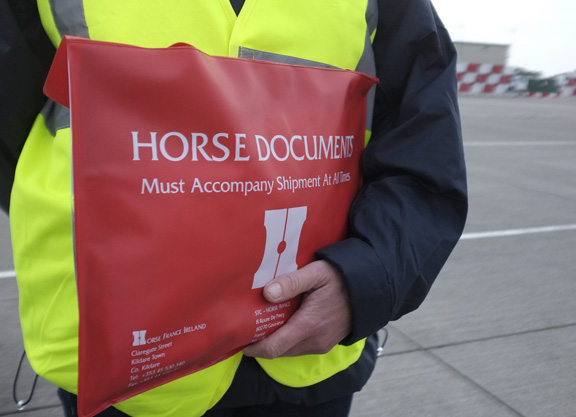By Emma Berry
The British government has confirmed that horses being transported from EU member countries to the UK after March 29 will be able to travel under the regulations currently in place, but equine traffic going in the opposite direction could be halted unless Britain is granted listed status by the European Commission.
The government's Department for Environment, Food and Rural Affairs (DEFRA) on Thursday issued guidance pertaining to the movement of horses between EU countries in the case of a 'no-deal' Brexit.
With just 36 days remaining before Britain is to leave the EU, uncertainty remains as to the manner of its departure, with the potential for Britain to exit without a deal with EU member states becoming an increasing concern.
This lack of clarity naturally affects not just the sport of horseracing but breeders looking to move mares for cover during the height of the breeding season. Free movement of Thoroughbreds between Britain, Ireland and France is currently allowed under the Tripartite Agreement (TPA), which Britain will no longer able be able to benefit from after it ceases to be a member of the EU. However, if Britain leaves the EU with a deal then the TPA would continue throughout the agreed transition period until the end of 2020.
The statement from DEFRA read, “Leaving the EU with a deal remains the government's top priority. This has not changed. We are continuing with our 'no-deal' preparations to ensure the country is prepared for every eventuality.
“The UK has already committed to allowing continued movement on all equine animals from EU member states to support the industries that rely on these animals and ahead of major horseracing events, such as the Grand National Festival at Aintree.
“The government is continuing to negotiate with the European Commission on securing listed status for the UK, which would enable the continued movement of equines to EU member states. The guidance published today is designed to give the owners of horses and other equine animals as much time to prepare for these new processes and factor in any extra travel time they may require when travelling to and from the EU.”
The key concern now for the racing industry will be that the UK is granted listed status by the European Commission after its departure from the EU on March 29. Movement of horses from the UK to the EU will not be possible after that date until listed status is secured.
“Delivering a negotiated deal with the EU remains the government's top priority, but it is our job to responsibly ensure we are prepared for all scenarios, including no deal,” said Animal Welfare Minister David Rutley.
“This guidance will help businesses and owners prepare for life after 29 March if we do leave without a deal. However, it is in the interest of the EU to reciprocate our commitment on the movement of horses. This will ensure horseracing and competition events across the continent can continue to be attended by all of Europe's top equine talent.”
Since the EU referendum in June 2016, the British Horseracing Authority (BHA) has been working closely with Horse Racing Ireland (HRI) and France Galop in presenting racing's case to the governments of the three nations.
“DEFRA have submitted the application and the EU has indicated that it will act quickly to list the UK for entry of live animals to the EU but none has yet been given,” said Ross Hamilton, Corporate Affairs Manager for the BHA. “We'd obviously be keen to see a deal, which would avoid any disruption given that the transition period extends to the end of 2020.”
Britain agreeing to a deal with the EU before departure, or a delay to Article 50 deferring its departure date, are also the preferred options from the perspective of Irish horsemen, according to Brian Kavanagh, Chief Executive of HRI.
He said, “If either of those two options occur the Tripartite Agreement will effectively continue through the transition period. In the case of a no-deal Brexit, we obviously hope that Britain will be listed in the highest category to allow horse movement to continue. Horses coming into Ireland would have to go through Border Inspection Posts and will require health certificates, and that would obviously entail extra red tape and extra costs. To lose out on the transition period would be very disappointing.”
The majority of horse transport between Britain and Ireland is conducted via ferry and only two Border Inspection Posts exist in Ireland, at Dublin and Shannon airports. A third is currently under construction at Dublin's ferry port.
Speaking on behalf of the Thoroughbred Breeders' Association, Chairman Julian Richmond-Watson said, “We fully support the government's welcome and pragmatic position to allow continued equine movement under current systems from EU member states to the UK in a no-deal scenario.”
In the event of a no-deal Brexit, DEFRA has advised that after March 29 horses travelling from the UK to the EU may need to undergo additional blood tests, which will need to be carried out within 30 days or less of travelling to satisfy EU regulations. Owners should consult a vet at least six weeks before the planned date of travel. All horses will also need an Export Health Certificate and some equines will also need a government-issued travel ID document in addition to an existing equine passport.
A full list of the guidelines issued for a no-deal Brexit can be found here.
Not a subscriber? Click here to sign up for the daily PDF or alerts.






